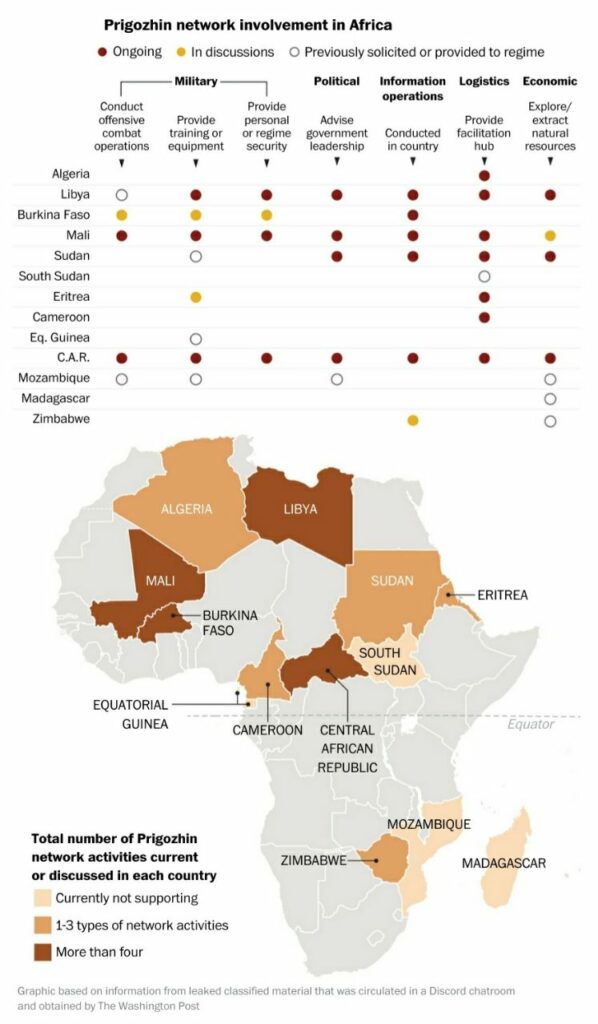By Greg Miller and Robyn Dixon
May 05, 2023 at 2:00 a.m. EDT
The Wagner Group is moving aggressively to establish a “confederation” of anti-Western states in Africa as the Russian mercenaries foment instability while using their paramilitary and disinformation capabilities to bolster Moscow’s allies, according to leaked secret U.S. intelligence documents.
The rapid expansion of Russia’s influence in Africa has been a source of growing alarm to U.S. intelligence and military officials, prompting a push over the past year to find ways to hit Wagner’s network of bases and business fronts with strikes, sanctions and cyber operations, according to the documents.
At a time when Wagner leader Yevgeniy Prigozhin has been preoccupied with Kremlin infighting over the paramilitary group’s deepening involvement in the war in Ukraine, U.S. officials depict Wagner’s expanding global footprint as a potential vulnerability.
One document in the trove lists nearly a dozen “kinetic” and other options that could be pursued as part of “coordinated U.S. and allied disruption efforts.” The files propose providing targeting information to help Ukraine forces kill Wagner commanders, and cite other allies’ willingness to take similar lethal measures against Wagner nodes in Africa.
And yet, there is little in the trove to suggest that the CIA, Pentagon or other agencies have caused more than minor setbacks for Wagner over a six-year stretch during which the mercenary group, controlled by Putin ally Prigozhin, gained strategic footholds in at least eight African countries, among 13 nations where Prigozhin has operated in some capacity, according to one document.
The only direct military strike mentioned in the files refers to “a successful unattributed attack in Libya” that “destroyed a Wagner logistics aircraft.” The document provides no further detail about the operation or why that single plane — part of a far larger Wagner fleet — was targeted.
The most significant American attack against Wagner was near Deir al-Zour, Syria, in February 2018, when U.S. airstrikes killed several hundred Wagner fighters who were attacking several dozen Delta Force soldiers, Rangers and Kurdish forces next to a gas plant.
Overall, the trove portrays Wagner as a relatively unconstrained force in Africa, expanding its presence and ambitions on that continent even as the war in Ukraine has become a grinding, if not all-consuming, problem for the Kremlin.
As a result, “Prigozhin likely will further entrench his network in multiple countries,” one of the intelligence documents concludes, “undermining each country’s ability to sever ties with his services and exposing neighboring states to his destabilizing activities.”
Wagner’s rise heralds a new surge of great power competition in Africa and with it a resurgence of authoritarianism, said Anas El Gomati, director of the Tripoli-based Sadeq Institute think tank.
Wagner, he said, is “a solution to the kind of problems that African dictators find themselves in: Democratic pushback? No problem. We’ll help you with that, whether it’s tampering with ballots, or whether it’s literally fighting brutal kind of insurgencies like they have in [the Central African Republic] and in southern Libya.”
“If you’re suffering trying to get your resources and minerals out of your country, ‘not only can we bring [those] services to you, but we’ll put those dollars in your bank and no one will be any the wiser’ — because they operate these massive networks of shell companies,” he said, referring to Wagner.

Prigozhin entities have not only accelerated operations in Africa over the past year, according to the assessments, but appear to be operating with expanded ambition and authority — “shifting his approach from taking advantage of security vacuums to intentionally facilitating instability,” according to one of the documents.
The description appears on a slide marked with symbols indicating that it was prepared for U.S. Army Gen. Mark A. Milley, the chairman of the Joint Chiefs of Staff, and his senior advisers. A footnote summarizes Prigozhin’s “aggressive agenda,” citing plans to counter U.S. and French influence in Burkina Faso, Eritrea, Guinea, Mali and other countries, as well as Wagner’s direct support for a coup plot in Chad by setting up a cross-border training compound for rebels.
Chad has long been a linchpin of French and U.S. counterinsurgency operations against armed Islamist groups in the Sahel, and French President Emmanuel Macron signaled its importance when he attended Idriss Déby’s funeral in 2021.
One of the documents in the trove indicates that France “has communicated a willingness to strike Wagner if the [paramilitary organization] supports a coup in Chad.”
Prigozhin did not respond to a request for comment about the documents. Earlier, he told The Washington Post in response to questions about Chad that any suggestion that he had a role in destabilizing the transitional government there was “nonsense.”

